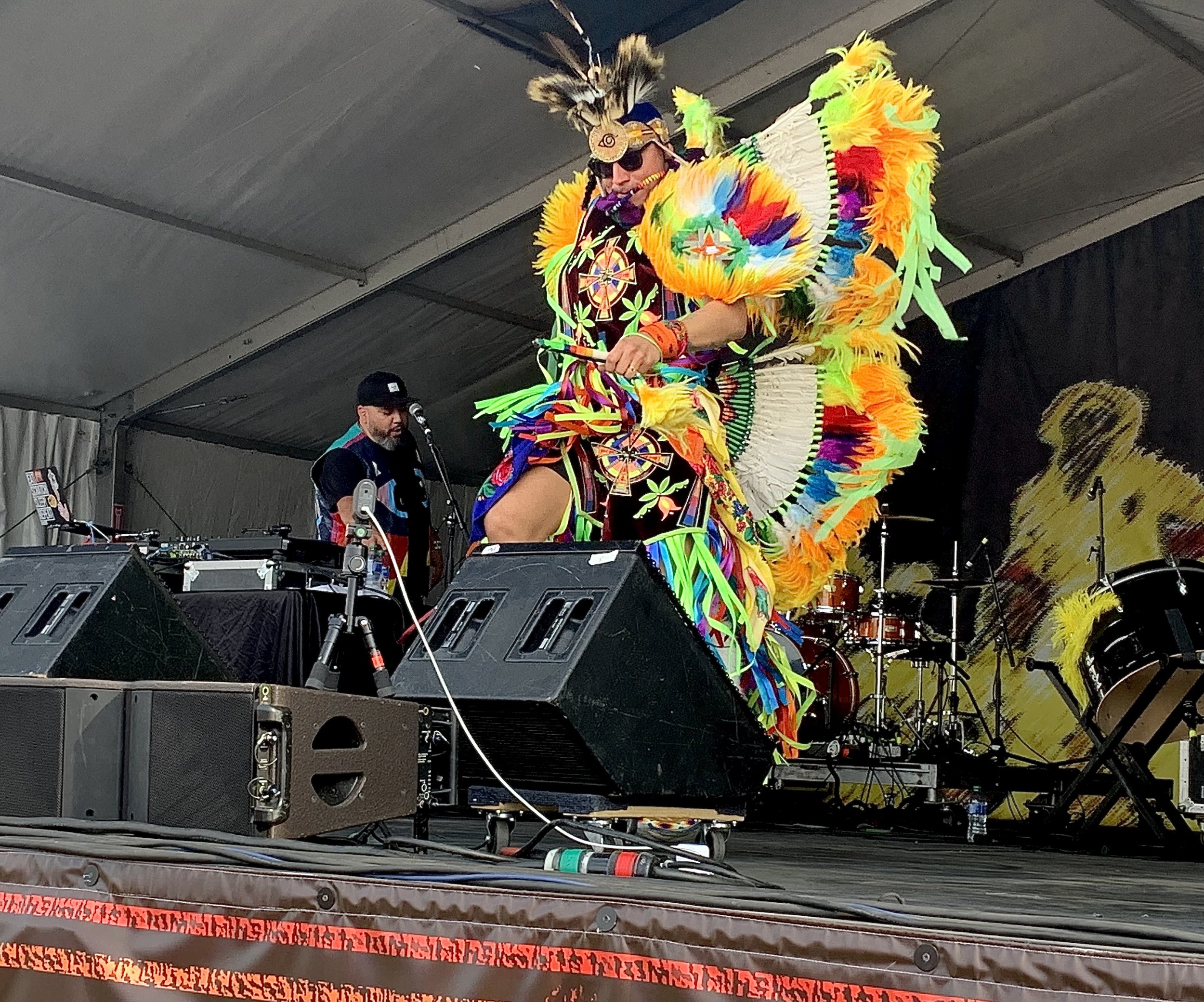DJ Shub Brings Tribal Dubstep to Jazz Fest

The First Nations DJ and producer works his heritage into his sound on "Pow Wow Step," and he faces questions other DJs don't for that reason.
DJ Shub makes an unlikely return to Jazz Fest Friday. The Canadian DJ and producer last played Jazz Fest in 2013 as part of A Tribe Called Red—the first act to bring dubstep to the festival. Musically, the trio were smart, funny and political as they made their Native American heritage central to their music, whether by addressing the racism of many sports mascots, or by working tribal chants and drums into their music. Still, electronic dance music has rarely been Jazz Fest’s flavor, and even the faithful who usually stake out territory by the shade trees at the back of the Gentilly Stage waited until Bonerama to find their spots. Shortly after, Tribe tried to play a smaller set in a tent and almost immediately blew the power. It seemed like Jazz Fest and dubstep were destined to walk separate paths, but Shub is back.
“That was the scary part,” he says. “The majority of there had never heard this type of music before. To be the first electronic artist to play that stage was nerve-wracking for sure.”
This time, he’ll play a more forgiving stage—the Jazz and Heritage Stage at 3 p.m.—and he’ll be on his own. He left A Tribe Called Red in 2014 because the band’s increasingly busy tour schedule made it hard for him to maintain the family life he wanted. Shub wanted to flex his own musical muscles as well, but he had two main goals: “Travel less. Work from home,” he says. “I’m able to do that now.”
From his family life to his music, Shub has worked to bring his musical and personal life in line with his cultural values. He is a member of the Turtle Clan and a Mohawk Indian, and began as a battle DJ, and his Soundcloud page features a few years’ worth of moombahton tracks and other hybrids that represent his effort to find his music. “Few other people were doing this,” he says. His Pow Wow Step EP celebrates tribal drums and songs and the culture they represent, while A Tribe Called Red uses those sounds to address the culture’s issues.
Because the tribal songs mean something, Shub faces basic questions that other DJs and producers don’t. He has to think about culturally respectful ways to represent them, and some songs are too hot to use. “Honor songs—you just avoid them,” he says. “Those songs are sacred. I like to get permission. If I think I’m overstepping my boundaries, I’ll talk to the singers.” Many of the songs he mixes into his sound are intertribal songs designed to make people dance, and with those Shub has simply found the most modern expression of an ages-old idea.
On Pow Wow Step, Shub is careful to credit the singers of the songs that he uses as source material, and his impulses are again a combination of personal ethics and cultural consciousness. “Without their original music and compositions, the song wouldn’t be what it is,” he says. “The are a huge part of the success of the music.” Unlike other DJs, he isn’t strictly speaking sampling since many of the tribal songs don’t exist on record, and those that do are essentially field recordings. To get recordings that sound good, he had to get the singers and drummers into the studio, and it’s hard to ask someone to come in and perform without at least giving them credit. It’s also, Shub says, “a time saver.”
A Tribe Called Red encountered some wariness from drum groups at first because electronic dance music incorporating tribal sounds and samples was new at the time. “They were iffy about us using this music, but it opened doors and opened eyes,” Shub says. “You can still make electronic music and incorporate your culture into it.” When a group of Northern Cree drummers attended a festival he played, they saw the concept in context and embraced the music he was making.
Some of the usual generational tensions that surround electronic dance music affect Shub too. Dubstep still alienates and perplexes audiences used to more conventional instruments and song structures, but the way he makes his cultural roots transparent has earned him at least anecdotal acceptance from older members of the tribe. “It’s traditional music and club music,” he says. “I’ve gotten messages from a grandma or an old aunt saying I bought my grandchild or I bought my nephew an album and now we spend time together.”
He has encountered more push back for where the music is played than for the respectfulness of the use. Tribal elders have expressed concerns about Shub performing in bars, clubs, or places that serve alcohol—a natural place to perform in cities for urban Indians. “But it’s always followed with I love what you’re doing.”
“You have to respect your elders,” he says, “but you also have to go with the times.”






